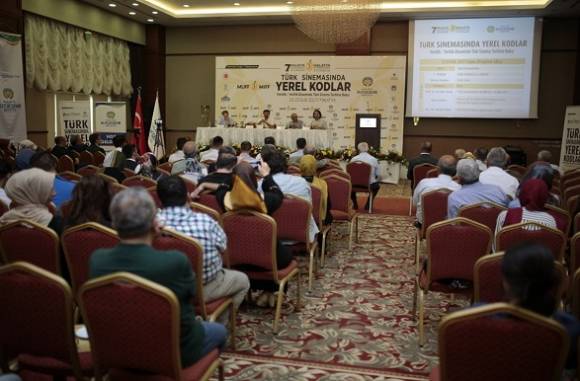The symposium was held on 22-23 September, and the first session, which took place on September 22nd, was attended by Mayor Ahmet Çakır, Deputy Secretaries-General of the Municipality, Festival Director Suat Köçer, Deputy Mayor of Battalgazi, Vice Rector of İnönü University, AKP Vice Provincial Head, several officials, university students, and the cinema enthusiasts in Malatya.
In his opening speech, the Festival Director Suat Köçer emphasized the importance of discussing a major issue of 100-year-old Turkish cinema at the 7th edition of MIFF, and expressed his great joy for the participation of many esteemed film professionals. He also added that the content of the symposium will be compiled in a book, and many surprises are in store at this year’s Malatya International Film Festival.
Mayor Çakır also delivered a welcoming speech, noting that the symposium will contribute a great deal to the festival with the extensive discussion on indigenousness, which is an important concept as per the identity arguments in Turkish cinema.
Indigenousness Lies in Art, Not in Academy
The first session entitled “Turkish Cinema and Indigenousness” was moderated by İshak Aslan. “Discussion of indigenousness is associated with universalism,” Aslan said. Following his speech, Prof. Dr. Kurtuluş Kayalı took the floor. In his speech entitled “Indigenousness or Localism in Turkish Cinema?”, Kayalı reminded that the indigenousness emphasis, which was initiated by Kemal Tahir, was transferred to the silver screen by the first generation film directors, and that the academics’ quest for indigenousness is relatively a thing of the past. In this regard, “The values of this society lie in art, not in the academic texts,” he said. The symposium continued with Barış Saydam’s disquisition entitled “Transition From National History Thesis to National Cinema: A Panorama of the First Half of the 1950s,” and ended with Researcher Mesut Bostan’s speech. Bostan remarked that Kemal Tahir’s concerns about indigenousness have been thoroughly revealed in Lütfi Akad’s films.
The Most Prominent Influencer: Kemal Tahir
The second session entitled “Pursuits in Yeşilçam” was moderated by Abdulhamit Güler, who noted that indigenousness is an important essential not only in cinema, but also in many aspects of life. Following his speech, Festival Director Suat Köçer took the floor. “Knowledge of Kemal Tahir’s literature is equivalent to the knowledge of a certain period of Turkey. Beyond being a novelist and a writer, Tahir was a significant ideologist who influenced the generations with his theses and ideas. Kemal Tahir’s works lead the way to indigenousness concept, and particularly the young filmmakers should benefit from the ideas of the great thinker,” Köçer said. The next speaker of the session, director Mesut Uçakan, addressed the spiritual pursuits and the National Cinema endeavor in Yeşilçam.
“The faith phenomenon underlies the indigenousness argument, and in this regard, the idea of National Cinema is a fundamental insight that should be emphasized,” Uçakan said.
In his speech entitled “Halit Refiğ and the National Cinema Struggle”, the final speaker, film director Nazif Tunç, addressed Halit Refiğ’s endeavors in the indigenousness concept. “Refiğ scrutinized not only the national cinema struggle and the issues of our cinema, but he also made the most significant films of the national cinema movement; “Gurbet Kuşları”, “Bir Türk’e Gönül Verdim”, “Harem’de Dört Kadın.”
Sustainability Is The Answer
The second day of the symposium started with the session entitled “In Between Theory and Practice”, moderated by Ass. Prof. Dr. Hediyetullah Aydeniz. In his speech entitled “Cinema Researches and Indigenousness/Localism in Turkey”, Researcher Dr. Yusuf Ziya Gökçek stated that a corporate disintegration exists in the cinema studies in Turkey, and the studies on Turkish cinema theory do not suffice.
“Ayşe Şasa had a unique critical approach although the producers and the directors interfered with her scenarios back then,” Researcher Meltem İşler Sevindi stated in her disquisition entitled “Indigenousness in Turkey: Through the Example of Ayşe Şasa.” In his speech entitled “The Reflections of Style and Traditional Arts in Cinema,” film director Derviş Zaim said that the traditional styles must be reformed in accordance with today’s conditions, adding that the arguments evolved around the indigenousness concept in the 60s did not offer any concrete results, and sustainability is the only solution.
No Insight Into the Rural
The fourth session entitled “Turkish Cinema After the 90s” was moderated by İhsan Kabil, and started with Hilal Turan’s speech, “Insight Into the Rural; Cinema of Ahmet Uluçay.”
“Uluçay’s legacy advises us to address the issue through authenticity first, not strong assertions,” Turan said. In his speech entitled “The Connotation of Folk Literature and Saga Tradition in Cinema,” Reis Çelik noted that the Turkish cinema is not nourished enough by the folk literature, and the ancient stories, sagas and tales should be adapted to cinema through a modern approach.
As the final speaker, Atalay Taşdiken delivered his speech entitled “Indigenousness in New Turkish Cinema.” “Recent Turkish cinema fails at providing a true insight into the rural.
A director’s depiction of the rural as an unlivable place is an outsider look, and making a realistic film about the rural is underrated due to the popular sense ,” Taşdiken said.
Through The Example of Iranian Cinema
Iranian films were discussed in the last session moderated by Faysal Soysal. In his speech entitled “A Comparative Analysis: Depiction of the Rural and the Rural People & Turkish Cinema,” Rıza Oylum emphasized that the Iranian filmmakers successfully depict the rural concept through personal stories, while the Turkish filmmakers can’t. The symposium continued with the speech of Majid Sheikh Ansari, Advisor at The Fajr International Film Festival. “In order to gain a place in the world cinema, the existing style must be renovated and diversified. Iranian filmmakers have managed to adapt an original style by seeking answers to the unanswered questions. And Turkish cinema can also succeed at this through an indigenous approach,” Ansari said.
In his closing speech, Suat Köçer said that the productive discussions at the symposium will contribute a great deal to the indigenousness arguments.




















